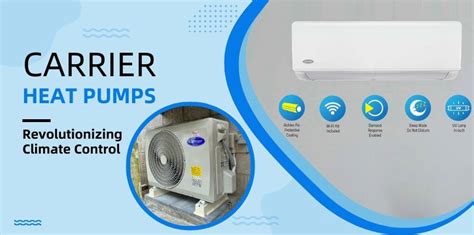The world is shifting towards a more sustainable and environmentally conscious future, and one of the key areas of focus is climate control. Traditional heating and cooling systems are not only energy-intensive but also contribute to greenhouse gas emissions, which exacerbate climate change. However, with the advent of climate tech, the game is changing. Climate tech heating and cooling systems are revolutionizing the way we control the temperature, providing a more efficient, sustainable, and environmentally friendly solution.
The Importance of Climate Control
Climate control is a critical aspect of modern life, particularly in extreme weather conditions. Traditional heating and cooling systems have been the norm for decades, but they have significant drawbacks. For instance, heating systems rely heavily on fossil fuels, which contribute to greenhouse gas emissions and air pollution. On the other hand, cooling systems use refrigerants that can harm the ozone layer and contribute to climate change. Moreover, traditional systems are often inefficient, wasting energy and increasing energy bills.
The Rise of Climate Tech
Climate tech, short for climate technology, refers to the use of innovative solutions to reduce greenhouse gas emissions and mitigate the impacts of climate change. In the context of heating and cooling, climate tech involves the development of more efficient, sustainable, and environmentally friendly systems. These systems leverage advanced technologies, such as artificial intelligence, Internet of Things (IoT), and renewable energy sources, to provide more effective and sustainable climate control.
Benefits of Climate Tech Heating and Cooling
Climate tech heating and cooling systems offer numerous benefits over traditional systems. Some of the key advantages include:
- Energy Efficiency: Climate tech systems are designed to be more energy-efficient, reducing energy consumption and lowering energy bills.
- Sustainability: Climate tech systems rely on renewable energy sources, such as solar and geothermal energy, reducing dependence on fossil fuels and lowering greenhouse gas emissions.
- Environmental Friendliness: Climate tech systems use environmentally friendly refrigerants and materials, reducing the risk of ozone depletion and air pollution.
- Increased Comfort: Climate tech systems provide more precise temperature control, improving indoor air quality and enhancing overall comfort.

How Climate Tech Heating and Cooling Systems Work
Climate tech heating and cooling systems work by leveraging advanced technologies to optimize energy efficiency and reduce environmental impact. Some of the key technologies used in climate tech systems include:
- Artificial Intelligence (AI): AI algorithms analyze data on energy usage, temperature, and humidity to optimize system performance and reduce energy waste.
- Internet of Things (IoT): IoT sensors and devices monitor and control system performance, providing real-time data and insights to optimize energy efficiency.
- Renewable Energy Sources: Climate tech systems integrate renewable energy sources, such as solar and geothermal energy, to reduce dependence on fossil fuels and lower greenhouse gas emissions.
- Advanced Materials: Climate tech systems use advanced materials, such as phase change materials and thermoelectric materials, to enhance energy efficiency and reduce environmental impact.
Types of Climate Tech Heating and Cooling Systems
There are several types of climate tech heating and cooling systems available, each with its unique features and benefits. Some of the most common types of climate tech systems include:
- Heat Pumps: Heat pumps use refrigeration to transfer heat from one location to another, providing both heating and cooling.
- Radiant Cooling Systems: Radiant cooling systems use radiant panels to cool buildings, reducing energy consumption and improving indoor air quality.
- Desiccant Cooling Systems: Desiccant cooling systems use desiccants to remove moisture from the air, reducing humidity and improving indoor air quality.
- Solar Cooling Systems: Solar cooling systems use solar energy to cool buildings, reducing energy consumption and lowering greenhouse gas emissions.

Challenges and Limitations of Climate Tech Heating and Cooling Systems
While climate tech heating and cooling systems offer numerous benefits, there are also challenges and limitations to consider. Some of the key challenges and limitations include:
- High Upfront Costs: Climate tech systems can be more expensive to install than traditional systems, although they often provide long-term cost savings.
- Complexity: Climate tech systems can be more complex to install and maintain than traditional systems, requiring specialized expertise and training.
- Interoperability: Climate tech systems may not be compatible with existing infrastructure, requiring additional investments in infrastructure upgrades.
Future of Climate Tech Heating and Cooling Systems
The future of climate tech heating and cooling systems looks promising, with continued innovation and investment in research and development. Some of the key trends and developments to watch include:
- Increased Adoption: Climate tech systems are expected to become more mainstream, with increased adoption in residential and commercial buildings.
- Improved Efficiency: Climate tech systems are expected to become even more energy-efficient, with advances in materials and technologies.
- Integration with Renewable Energy: Climate tech systems are expected to integrate more seamlessly with renewable energy sources, reducing dependence on fossil fuels and lowering greenhouse gas emissions.

Conclusion
Climate tech heating and cooling systems are revolutionizing the way we control the temperature, providing a more efficient, sustainable, and environmentally friendly solution. With their numerous benefits, including energy efficiency, sustainability, and increased comfort, climate tech systems are poised to become the future of climate control. While there are challenges and limitations to consider, the future of climate tech heating and cooling systems looks promising, with continued innovation and investment in research and development.






What are climate tech heating and cooling systems?
+Climate tech heating and cooling systems are innovative solutions that use advanced technologies to provide more efficient, sustainable, and environmentally friendly heating and cooling.
How do climate tech heating and cooling systems work?
+Climate tech heating and cooling systems work by leveraging advanced technologies, such as artificial intelligence, Internet of Things (IoT), and renewable energy sources, to optimize energy efficiency and reduce environmental impact.
What are the benefits of climate tech heating and cooling systems?
+Climate tech heating and cooling systems offer numerous benefits, including energy efficiency, sustainability, and increased comfort.
